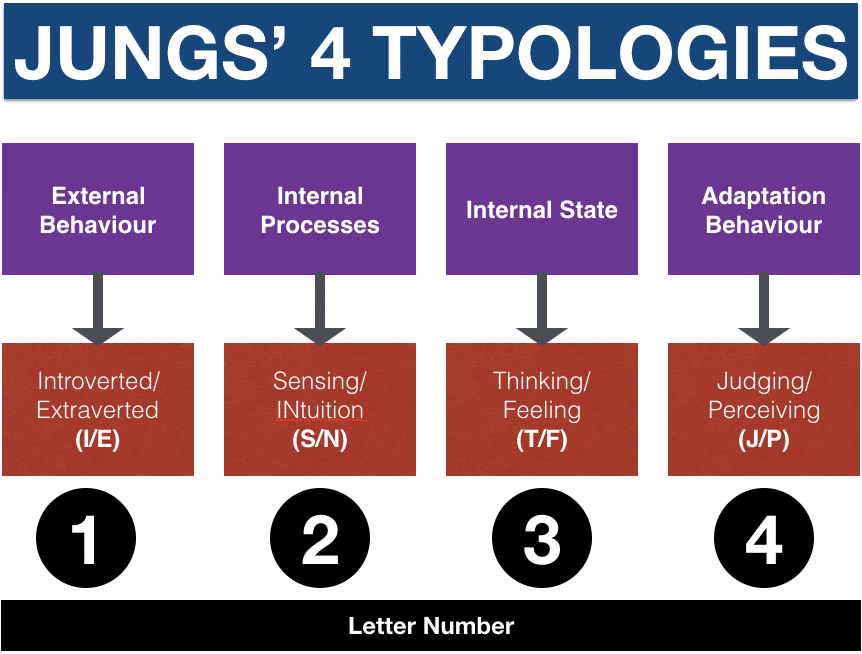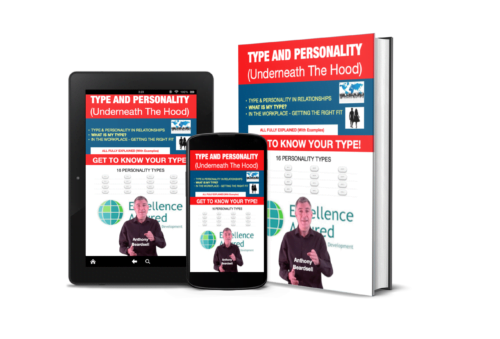16 Personality Types and Jung’s four typologies – 4 parts to personality
Personality Types come from Jung’s four typologies. Jung defined four different categories of psychological profile. A focus on:
- our external behaviour (I or E) – whether people are extravert and may need people around them to stimulate them – we all know people who are very extravert. We also know people who like to work alone, people who like to think alone
- our internal processes (S or N) – our cognitive thinking. Internal processes are beliefs, they are strategies that we run internally.
- our internal state (T or F) – refers to our our emotions our feelings. This is the way that we either make decisions based on our feelings, our emotions, or our dissociated, out-there, abstract way of viewing the world.
- our adaptation behaviour (J orP). Do we make the world adapt to us? Does the world have to change according to our thinking, or do we make the world change to suit ours? Or do we adapt to the world? Do we run around making sure that everyone is happy, changing our behaviour to make sure that other people are content?
The Four parts of personality – the continuums
The four parts of personality are all analogue rather than digital. They are continuums, each one is a continuum.
1) External Behaviour – Introvert or Extravert?
Jung predicted that we would have behavioural influence either internally or externally. Someone who is highly introvert will be very introverted inside themselves in their behaviour. Somebody who is very external will go out and find others to play with, they externalise their behaviour.
Introverts account for only about 25% of the population, it is estimated. The greater percentage of the population (75%) are extraverts.
You may get someone on the extreme end as an introvert, or someone else who is on the extreme end who is an extravert, and you get some people who are in the middle.
For example on a typical training day for me, at the beginning of the day and at the end of the day I am almost 100% introvert.
In the morning until I get in the hotel lift to go down to a training room, I am totally introverted. After I get in the lift in the evening moving away from the training room, I am again totally introverted.
In between these times I can be as extraverted as anyone.
In the course of a day, we can cycle from one extreme to the other. or we may remain at one extreme all of the time.
Personality types are not labels, they are not boxes, they are merely ways to facilitate our understanding of our relationship with others.
Someone who is highly introvert may be very territorial, they may need to concentrate, they may need a lot of internal depth to understand something, they may have very limited close personal relationships. In other words they probably only like one or maybe two close relationships. They may have lots of acquaintances but they may have only one or two close relationships.
Introverts are very internal in their reactions, they will walk into a room and you will extend your hand to them and they will not even see your hand and they will leave your hand swinging in the air!
The people who are very extravert will see you in the room, they will bounce across to you and they will grab your hand and not let go as they say ‘Hi. HOW are you?’ They may even hug you.
The person who is introvert will stand at the doorway and think ‘am I in the right place? I wonder if I will like this place?‘ They may creep into the room taking a couple of steps forwards. They may sit in their car outside meetings on their own until the meeting is just about to begin. They have a ‘don’t hug me’ sign across their forehead. If they see people in the room hugging and if their manager had told them to be there then they will stay in the room against their better judgement. They may alternatively leave there and then because they don’t do touchy, “huggy” stuff. They like their own space. They will sit at the back of the room where they have got their own space to be in. They will not sit in the front row. Introverts like their own space, their own territory.
Extraverts don’t care, extraverts will organise the office party for you.
Introverts will go to the party as long as they don’t have to sit in the middle of a big long table where they can’t get out. They will choose the end, preferably next to the door in case they suddenly have a headache and then have to leave because it is far too intense for them and they don’t do this. They will not want picking up to get there or leave, they want to drive themselves. Even if that means that they cannot have an alcoholic drink, they will drive themselves.
Introverts will think and then speak rather than just blurt. They need to reflect first and then come up with the answer. Extraverts just like to be sociable with everyone. They like to interact, they like range, breadth, complexity, simplicity. They don’t care as long as they are out there having fun and relating to people. Extraverts speak and then think., Five minutes later, when there is no-one else to talk to they will think, “Why on earth did I say that? That was a really stupid thing to say. Why don’t I think before I speak?”
.
2) Internal Processing – Sensor or Intuitor?
This is the second of Jung’s basic concepts. It relates to how we process information. Do we do it:
- in a way which is down to earth, sensible, practical – Sensor.
- in a way which is more about perspiration rather than inspiration? “Is this realistic? Can I use this?” – Intuitor
Someone who is high intuitor, is more about abstract concepts, is theoretical. “We don’t need to know how to use this. Let’s just think about it, lets just imagine where we can add it onto other pieces of information that we have got at a more abstract level, rather than on a detailed basis” ..
75% of the population is sensor. If you think about the structure of organisations, most people on the lower and middle ranks are paid less to do more in detail terms. The higher up you go in an organisation the more strategic we are supposed to be in our thinking and the more intuitive we are required to be in our thinking such that we earn the salary that we are being paid.
3) Internal State – Thinker or Feeler?
Someone who is a thinker will be objective, firm minded. They will be just and clear. They will think about policies in a detached and sensible way. They will make decisions. They will make decisions based on sensible, good judgement and logic.
On the other hand, someone who is perhaps more feeling will be fully associated and in the moment.
Someone who is a thinker will be out of the moment, dissociated, able to be objective.
Someone who is fully associated will be more in touch with their feelings. They will be more fairhearted. They will make decisions on what is “just and fair and nice”. They think that those ‘nasty’ people who make decisions based on logic are cold hearted! They will be very humane. They will like harmony. They like to appreciate and be appreciated, they make decisions based on values.
Thinkers make decisions based on logic and they think that people who make decisions based on feelings are soft in the head.
The proportion or distribution across the population is 50/50 Thinker/Feeler.
4) Adaptation Operator – Judger or Perceiver?
The adaptation operator is how we adapt the world to suit us or the other way around.
A high judger will be able to make decisions easily. They will be definite, they will be resolved, fixed, need closure. They will need you to be on time. They will like lists. They will like it all very tidy and organised. They like their Filofaxes and iCalendars.
The perceiver is usually fully associated. They have a whole lot of things that they could have been doing other than what they are actually doing at any one time. They may say to you “Isn’t this fabulous? I am just having a wonderful interaction with you. I don’t care that you are late, no worries.”
[fusion_woo_shortcodes]
[/fusion_woo_shortcodes]

